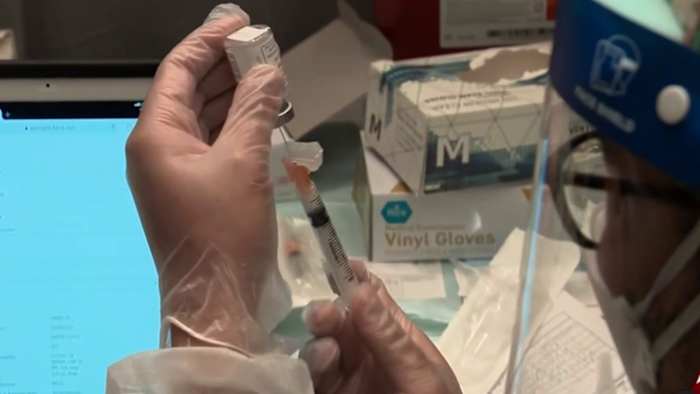SAN ANTONIO – There has been a surge in COVID-19 diagnoses in San Antonio and around South Texas.
Doctors call it the “summer surge” and San Antonio seems to be just passing the peak.
The new variant, Nimbus, is not causing a spike in hospitalizations, but doctors are still warning about the symptoms.
“Having symptoms like a really severe flu, muscle aches, sore throat, cough, feeling really fatigued, even after they’ve gotten past the COVID. It takes a while to get back to normal,” said Dr. Jason Bowling, an infectious disease specialist with University Health and UT Health San Antonio.
Bowling said anyone can get long COVID-19, including healthy people who have mild cases of the virus.
Long COVID is a condition where symptoms stick around, or even worsen, for months or years after a bout of COVID-19.
That is why many people get COVID-19 vaccines every year.
However, this year, the Food and Drug Administration announced new vaccine restrictions.
In years past, anyone six months or older could get the COVID-19 vaccine.
Now under the Trump administration, the vaccine is being reserved for people 65 or older, or those with a high-risk condition identified by the Centers for Disease Control.
The restrictions are raising questions among doctors, pharmacists and insurance companies as they determine how to prescribe or process the vaccines.
Typically, vaccine recommendations have come from the Advisory Committee on Immunization Practices, which relays suggestions to the CDC before it makes official recommendations.
Bowling said recent changes have delayed that timeline.
“All 17 pre-existing members of the ACIP were removed from that board and replaced with nine new members,” Bowling said. “The CDC has had a lot of layoffs as well, which explains some of the delays in that timeline.”
The advisory committee’s recommendations typically come with specific guidance.
“They usually make recommendations, so it’s easier for people to know: ‘Can pharmacists administer it?’ ‘Do you need to see your doctor first?” Bowling said. “It also helps insurance companies have a better understanding of who they’re going to reimburse the vaccine for.”
Without that full clarity from the government agencies, there’s one universal piece of advice.
“I think anyone who wants the COVID-19 vaccine should talk to their doctor about getting it,” Bowling said. “They’re going to know your medical history, and doctors can prescribe something off-label as well and can be your advocate and sort it out for you.”
Those looking to get the vaccine may also call their insurance company and ask how they are handling COVID-19 vaccine reimbursements, Bowling said.
The committee is scheduled to meet next week, and Bowling hopes they will take up this topic and release more details or suggestions on how the vaccine rollout will work.
As for the COVID-19 surge right now, Bowling said he gets a lot of questions about how long COVID-19 is contagious.
“The advice on when to return to work or school has been simplified to make it more practical for people,” Bowling said. “It’s when you’re no longer having a fever for 24 hours without fever-reducing medications like Tylenol or Ibuprofen, and you feel better, you can return to work or school.”
“It’s still recommended you take measures to reduce your risk of transmission to others for five days,” he added.
Reducing transmission can be accomplished through isolation or by wearing a mask.
“Because people still do shed virus for about 5 days,” Bowling said, “maybe a little bit longer after symptoms have started.”
While there is typically a summer surge like the one happening now, Bowling said the largest surge usually happens in the winter months around December and January.
Read more on KSAT:
Copyright 2025 by KSAT – All rights reserved.
